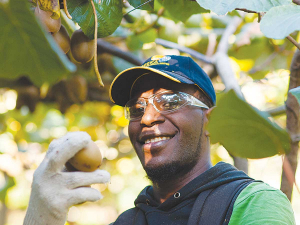HortNZ says the Government is moving in the right direction with its increase in recognised seasonal employers (RSE) workers.
But it says even more RSE workers are still needed to support horticulture’s big growth.
RSE is the name for the seasonal labour scheme where workers from the Pacific come to NZ for six to seven months for harvest and pruning. Once that work is done they return home to their families in the Pacific.
“RSE workers are playing a key role in the horticulture industry’s continued growth in response to rising export and domestic demand,” says HortNZ chief executive, Mike Chapman.
“NZ’s horticulture export revenue jumped 13.7% to $6.1 billion in the year to June 30, 2019. It’s expected to grow by another 3.8% to $6.3b in the current financial year.
“This growth is why we asked the Government for an even greater increase in RSE worker numbers, to support our growth and make up for the shortage of available NZ workers, particularly during peak times like harvesting and pruning.”
Chapman says it is good to have certainty for the current season and next season. The Government has provisionally announced that another 1600 RSE workers will be added, pushing the total from 14,400 this season to 16,000.
He says the RSE scheme has enabled the continued expansion of fruit, vegetable and wine grape growing in NZ.
“The availability of RSE workers also gives certainty to NZ businesses so they can continue to grow and employ additional permanent NZ workers.”
Hort NZ says last season Pacific RSE workers earned at least NZ$50 million.











